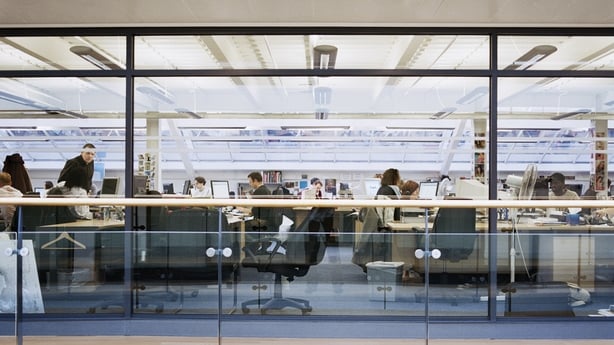It is one of the most significant changes to the way we work since the industrial revolution.
The sudden onset and fast pace of change was always going to lead to conflicting perspectives on remote work, and now, tensions are emerging between office advocates and those who favour remote working.
Amazon has told its corporate employees that they must return to working in the company's offices five days a week from January.
Tesla boss, Elon Musk, is strongly opposed to remote working, saying anyone working from home is "phoning it in".
Other tech firms like Dell and banks like JPMorgan are also enforcing return-to-office mandates.
A recent KPMG survey showed 79% of corporate CEOs in the US predicted that corporate roles performed in the office before the pandemic will be back in office full time within the next three years - that's a massive jump from only 34% a few months ago.
Will companies in Ireland follow the trend?
According to a survey published by IrishJobs, the number of fully remote jobs was the lowest in almost four years, falling to just 1.9% in October.
The report by the hiring platform revealed that hybrid vacancies have remained relatively stable, fluctuating between 11.2% and 12.4% over the past six quarters.
Morgan McKinley's latest Quarterly Employment Monitor for the third quarter shows an overall decline in job vacancies, with a 2.1% drop compared to the previous quarter and a 4% decrease year-on-year.
The report found that employers face growing challenges as they push for increased on-site presence, with many requiring employees to be in the office at least three days a week.
Trayc Keevans, Global FDI Director, Morgan McKinley Ireland, said, "While the labour market shows signs of contraction, it remains resilient".
"Many firms are increasing on-site presence requirements, further narrowing the talent pool as candidates favour remote or hybrid work."
And while many candidates and employees favour remote or hybrid work, not all employers do.
Productivity
Productivity levels whilst remote working have been a constant concern for one third of all businesses, according to the latest Dublin Business Outlook produced by Dublin Chamber.
It revealed that four times as many firms feel that their staff are more productive in the office than when working from home.
"Businesses have been navigating the complex area of hybrid and remote working since the onset of the pandemic," said Aebhric McGibney, Director of Public and International Affairs.
"In a tight labour market, many firms find that workplace flexibility, including hybrid and remote working, suits both the business and employees. Most firms are keen that staff are in the office two and three days a week for reasons around culture, innovation and collaboration."
"When it comes to productivity, about half of all firms feel employees work equally well at home or in the office. But for the remainder, the balance is four to one saying staff are more productive in the physical workplace."
Dublin Chamber acknowledges that as the world of work continues to evolve, businesses must adapt. It advocates for striking the right balance and adopting effective hybrid models that work for business which will be crucial for attracting and retaining talent in the long term.

It turns out that Dublin is one of the most attractive cities in Europe for the ultimate remote workers; digital nomads.
That is according to the latest bunq Working Abroad Index launched by the neobank last week.
It reveals that Dublin has surpassed other European cities to become amongst the most expensive for digital nomads.
It found that the cost of living is high for digital nomads in Dublin, with even co-working spaces now more expensive due to the rise of remote work here.
Hubs
There are around 300 remote work hubs around the country with broadband access and other facilities.
Indeed, the Government estimated in 2023 that 24,000 people use these hubs every day.
Bank of Ireland is among the employers that has invested in remote working hubs as part of its hybrid working model.
The policy is proving popular, with a staff survey showing that 65% feel the enhanced flexibility is providing more time to spend with family, and less time commuting.
Working from home and coworking spaces has inevitably had knock-on implications for commercial property. It has enabled employers to adopt hot-desking and rostering systems which reduce the amount of office space they need, and it has led to a reduction in demand for office accommodation.

Office market
Dublin currently has one of Europe’s highest office vacancy rates, though the office market is seeing signs of improvement.
According to recent data from commercial real estate and investment management company JLL, 2024 is set to be the most active year for Dublin's office market since the Covid-19 pandemic disrupted the sector.
Their data shows robust leasing activity between July and September.
570,000 sq ft of office space was leased during the three month period, bringing the total so far this year to 1.7m sq ft.
The third quarter outperformed the five-year quarterly average by 15.6%, with the number of deals signed up 28.7% in the same period.
The Future of Work
Research by employers group, Ibec, has found that since the publication of the Code of Practice for Employers and Employees on the Right to Request Flexible and Remote Working under the Work Life Balance Act last year, 24% of companies have received applications for flexible or remote work.
The research also shows that between 2023 and 2024, there has been a significant increase in the implementation of compulsory attendance for all or certain days - up 6% to 26%.
At the same time, attracting and retaining talent for fully on-site roles continues to be more challenging, with over half of employers stating that it is more difficult compared to hybrid and remote roles.
This is not unique to Irish employers. While Elon Musk is opposed to WFH, Tesla's remote work policy has caused problems filling jobs and the company was forced to make exceptions.
Ibec also asked members about their plans to change office policies, and 26% of companies with off-site workers said they are considering increasing on-site attendance, but the majority (53%) have no plans to do so.
"Research indicates that despite perceived tensions between employers and employees over returning to the office, we are still iterating to achieve the most effective hybrid and remote work solutions," said Maeve McElwee, Executive Director of Employer Relations at Ibec.
She said these solutions offer flexibility while also addressing employers' future needs.
Ms McElwee said data on enforcement, formal remote work requests, and planned changes suggest that companies aim to establish sustainable work practices that benefit both their staff and the business.
"In most cases, employers are striving to balance flexible working with operational requirements, company culture, and the need to support new or less experienced colleagues."
"While there is a growing trend toward increased in-person attendance when comparing 2023 to 2024, remote and hybrid options are still being offered where they benefit both employees and the company," she said.
"Additionally, businesses are implementing various initiatives to encourage on-site attendance, with team and collaboration days being the most common."






